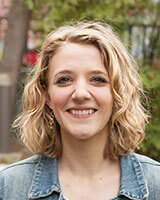
My mom participated in SPU’s honors program in the early 1980s, so I was aware of it. But what really sealed the deal for me was the rigorous, engaging interview process. It illuminated our critical thinking as we discussed current issues and their relation to faith and scholarship.
Coming out of high school, I wanted to be challenged — both by curriculum and by those around me. I had loved Greek and Roman mythology, so the UScholars’ early emphasis on Greek classics (reading The Odyssey over the summer and The Illiad and The Aenead in the fall) appealed to me.
But the books that challenged me were those outside my tradition — both as a Christian and as a privileged white American.
Chinua Achebe’s Things Fall Apart was the first book by an African author I’d read. African literature has now become the driving interest of my academic life. My honors project was a collection of three short stories about the religious experiences of Ethiopian evangelical Christians, inspired by my work and time there the summer before my senior year. I was interested in the ways in which conversations about faith mapped onto and used existing story structures in the culture’s consciousness.
Probably most of all, I was impacted by the books recommended by other students in my cohort (and those above us, who were always willing to give advice). These included Marilynne Robinson’s Gilead, James Baldwin’s Go Tell It On the Mountain, and Margaret Atwood’s A Handmaid’s Tale.
Looking back, I see with greater clarity the ways in which our professors presented us with a wide array of viewpoints, interpretations, and perspectives; shed light on the tensions of their vocabularies, interconnections, and implications; and encouraged us to wrestle with difference and uncertainty. This helped some of us let go of our inherited need to be right and certain, and pushed us to consider and respect the experiences and beliefs of others.
Above all, I’m thankful for the ways some faculty — especially Dr. Keuss, Dr. Congdon, Dr. Macdonald, Dr. Chaney — made the questions and challenges of their faith accessible to us. They modeled what it looks like to be confronted with ideas, texts, theories, and realities that seem opposed or threatening to faith, and they opened up about their questions and struggles, their convictions and comforts. They never told us it would be easy, but they lived in a way that showed it was possible and fruitful.
After I graduated from SPU, I completed a one-year intensive master’s degree in African Studies at Stanford University. I hope to pursue this further through a PhD in Literature, with the ultimate goal of bringing African literature into the American classroom. For the next year, I will be working as a City Year corps member in inner-city Sacramento schools, helping students with their reading and writing.